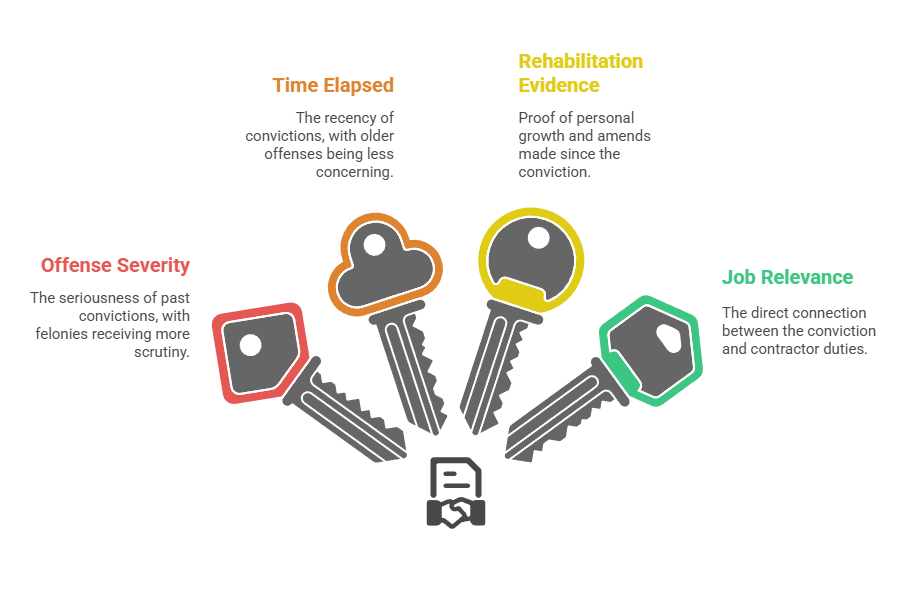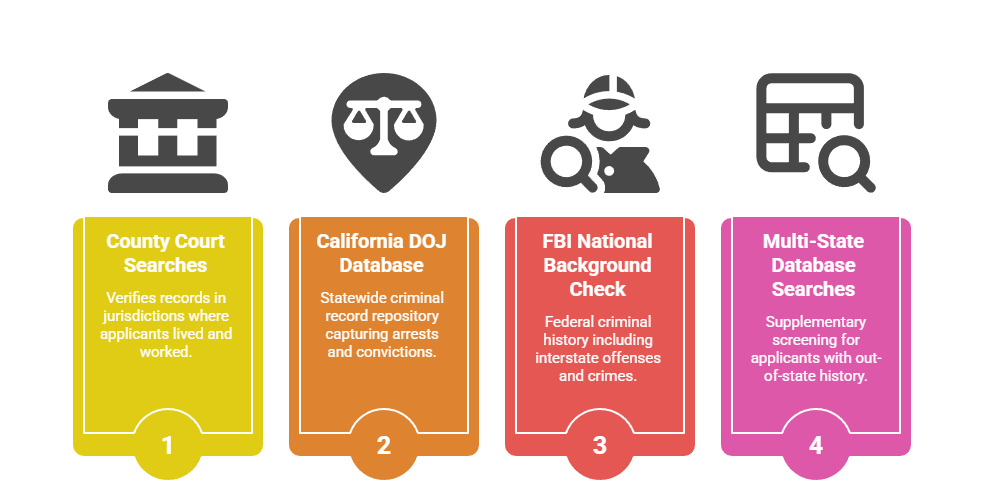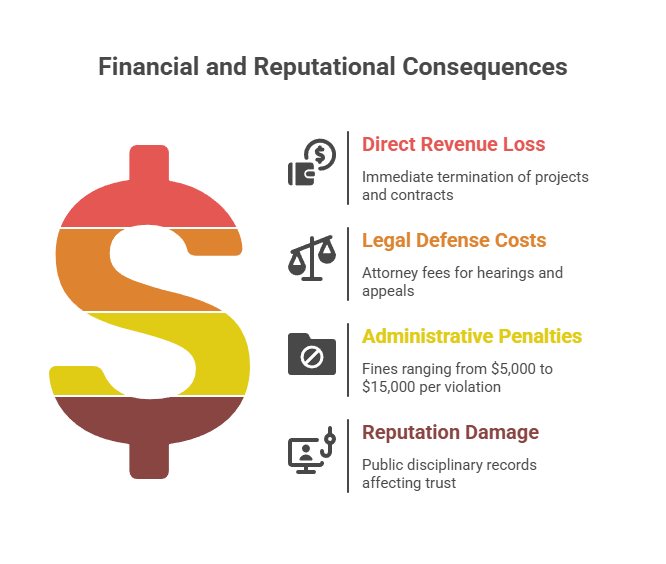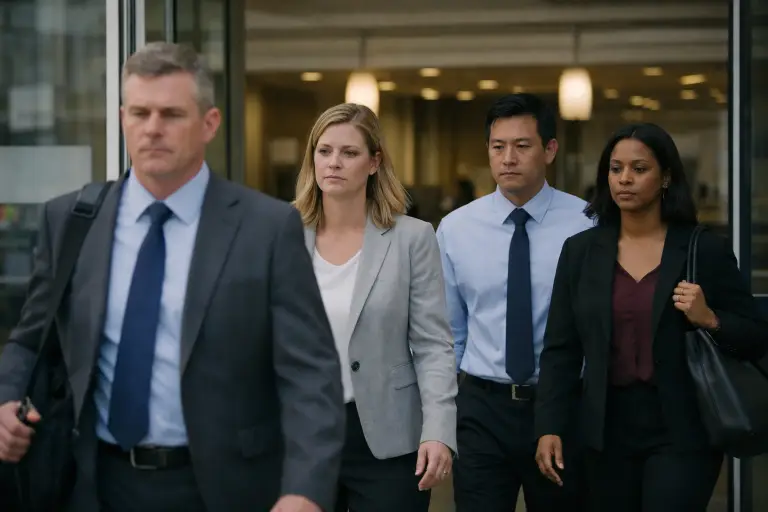California solar contractors face a complex web of background check requirements spanning CSLB licensing mandates, utility company credentialing protocols, and evolving state labor regulations—with non-compliance exposing businesses to license suspension, contract disqualification, and significant financial penalties. This guide provides solar company owners and HR managers with actionable strategies to navigate California's multi-layered screening requirements while building compliant, qualified workforces capable of meeting the state's ambitious renewable energy installation targets through 2030.
Key Takeaways
- California C-10 electrical contractors must undergo comprehensive background verification through the CSLB, including criminal history checks and financial responsibility reviews, before legally performing solar installation work.
- Major utility companies including PG&E and SCE maintain separate contractor credentialing programs requiring additional background screening beyond state licensing requirements, creating dual compliance obligations for solar businesses.
- Solar contractors working on residential properties must comply with California's Theft or Dishonesty Exclusion Act (AB 2518), which mandates background checks for employees with home access, with violations resulting in civil penalties up to $5,000 per incident.
- Criminal background checks for solar installers must follow California's "ban the box" legislation and Fair Chance Act requirements, prohibiting blanket disqualifications and requiring individualized assessments of conviction relevance to job duties.
- Fingerprint-based DOJ and FBI background checks are mandatory for all C-10 license applicants, with results processed through the CSLB's application system and maintained for regulatory compliance verification.
- Solar companies must implement continuous monitoring programs rather than one-time background checks, as CSLB regulations require ongoing verification of employee eligibility and compliance with safety standards throughout employment.
- Non-compliance with California solar contractor background check requirements can result in license suspension, removal from utility-approved contractor lists, contract termination, and exclusion from California's Self-Generation Incentive Program (SGIP) and other rebate programs.
- Establishing documented background check policies aligned with FCRA requirements, California labor law, and industry-specific regulations creates defensible hiring practices while reducing liability exposure in California's highly litigious employment environment.
Understanding California's Solar Contractor Licensing Background Requirements
California's solar industry operates under some of the nation's most stringent regulatory frameworks. Background verification serves as a foundational element of contractor qualification. The California Contractors State License Board (CSLB) administers comprehensive screening protocols designed to protect consumers while maintaining industry standards across the state's rapidly expanding renewable energy sector.
CSLB C-10 Electrical Contractor License Background Investigation
Solar installation companies require a C-10 electrical contractor license to legally perform photovoltaic system work in California. The CSLB application process includes mandatory criminal background checks conducted through Live Scan fingerprinting. This screening queries both California Department of Justice (DOJ) and Federal Bureau of Investigation (FBI) databases, examining applicants' complete criminal histories.
The CSLB evaluates criminal history using a case-by-case approach rather than automatic disqualifications. Key evaluation factors include:

- Offense severity and nature: Felony convictions receive greater scrutiny than misdemeanors, particularly those involving fraud, theft, or financial crimes.
- Time elapsed since conviction: Recent offenses raise more significant concerns than decades-old convictions with demonstrated rehabilitation.
- Rehabilitation evidence: Completion of probation, restitution payment, character references, and clean records since conviction strengthen applications.
- Job relevance: Convictions directly related to contractor responsibilities face heightened evaluation compared to unrelated offenses.
Applicants with disqualifying criminal histories may face license denial. However, the CSLB provides appeal processes and opportunities to demonstrate rehabilitation through documented evidence.
Financial Responsibility and Background Verification Standards
Beyond criminal history checks, California solar contractor background verification includes comprehensive financial responsibility assessments. The CSLB examines credit reports, bankruptcy filings, tax liens, civil judgments, and previous contractor license disciplinary actions.
Solar contractors must maintain minimum financial solvency standards throughout their licensing period. The CSLB conducts ongoing monitoring of license holders with authority to investigate complaints and audit business practices. License suspension or revocation can result from financial misconduct. For solar companies seeking to scale operations and bid on larger commercial projects, demonstrating sustained financial responsibility through clean background verification becomes essential for maintaining competitive positioning.
Responsible Managing Employee (RME) Background Requirements
Every C-10 licensed solar contractor must designate a Responsible Managing Employee (RME) who serves as the qualifying individual for the company's license. The RME undergoes the most intensive background scrutiny. This individual bears legal responsibility for ensuring all company operations comply with California construction laws and safety regulations.
The RME position cannot be held by individuals with certain disqualifying criminal convictions. Those who have previously had contractor licenses revoked also face exclusion. Solar companies must ensure their RME maintains clean compliance records, as any disciplinary actions against this qualifying individual can result in license suspension for the entire company.
Utility Company Contractor Credentialing and Background Screening
California's investor-owned utilities operate independent contractor credentialing programs that impose additional background check requirements beyond CSLB licensing. Solar contractors must navigate these separate screening protocols while maintaining compliance with state licensing standards. Major utilities including PG&E, SCE, and SDG&E each maintain distinct credentialing requirements.
PG&E Trade Ally Program Background Verification
Pacific Gas & Electric's Trade Ally program requires solar contractors to complete comprehensive background verification before gaining access to customer referral networks. The program provides rebate program participation and expedited interconnection processing. PG&E conducts business background checks examining multiple factors:
- Company ownership structures: Corporate entity verification and principal officer identification.
- Financial stability indicators: Credit ratings, bonding capacity, and insurance coverage verification.
- Consumer complaint history: Better Business Bureau ratings and customer satisfaction records.
- Individual technician screening: Background checks for workers performing system installations on PG&E infrastructure.
Solar contractors enrolled in PG&E's Trade Ally program face ongoing compliance monitoring. The utility maintains detailed performance scorecards tracking customer satisfaction, code compliance, and safety records. Contractors with negative background findings or performance deficiencies risk removal from the Trade Ally network.
Southern California Edison and SDG&E Contractor Requirements
Southern California Edison and San Diego Gas & Electric maintain similar contractor credentialing programs with distinct background verification protocols. SCE's Contractor Network requires participants to submit to business background investigations and insurance verification. SDG&E's approved contractor list mandates comprehensive background checks including criminal history reviews and driving record verification.
Both utilities have implemented enhanced background screening requirements in response to California's wildfire prevention mandates. Solar contractors working in High Fire Threat Districts face additional scrutiny regarding safety training documentation and prior violation histories. The utilities conduct regular audits of approved contractors with authority to immediately suspend credentialing for background check deficiencies.
California Labor Law Compliance in Solar Contractor Background Checks
California's employee-friendly labor regulations significantly impact how solar contractors conduct background screening. Strict requirements protect applicant rights while allowing employers to make informed hiring decisions. Solar companies must balance comprehensive background verification against California's "ban the box" legislation, Fair Chance Act provisions, and FCRA compliance obligations.
Fair Chance Act Requirements for Solar Installer Hiring
California's Fair Chance Act prohibits solar contractors from inquiring about criminal history on initial job applications. The law restricts when background checks can be conducted during the hiring process. Employers must extend conditional job offers before conducting criminal background checks. If considering adverse action based on criminal history findings, companies must provide applicants with individualized assessment opportunities.
The law requires solar contractors to evaluate specific factors when reviewing criminal convictions:
| Assessment Factor | Evaluation Criteria |
| Nature of offense | Type of crime, severity level, and relationship to job duties |
| Time elapsed | Years since conviction, completion of sentence, and rehabilitation period |
| Job responsibilities | Position duties, customer access requirements, and supervision level |
| Rehabilitation evidence | Education, training, employment history, and character references since conviction |
Solar companies must document their individualized assessment processes. They must maintain records of how criminal history relates to job duties and provide applicants with copies of background check reports.
FCRA Compliance and Background Check Disclosure Requirements
The Fair Credit Reporting Act imposes federal requirements on California solar contractors using third-party background check companies. Before obtaining background reports, employers must provide applicants with clear disclosure documents. Written authorization is required. If considering adverse employment action based on background check findings, solar contractors must follow FCRA's pre-adverse action protocol.
California's Investigative Consumer Reporting Agencies Act (ICRAA) creates additional state-level requirements beyond federal FCRA standards. Solar contractors must provide enhanced disclosure notices and allow applicants to review investigative files. Violations of FCRA or ICRAA requirements expose solar companies to statutory damages, attorney's fees, and class action litigation risks.
AB 2518 Theft or Dishonesty Exclusion Act Compliance
California's Theft or Dishonesty Exclusion Act specifically addresses background checks for workers accessing customer homes. The law directly impacts residential solar installers. It requires contractors to conduct criminal background checks on employees entering residential properties and prohibit workers with theft, burglary, or violent crime convictions from home access.
Solar contractors must implement documented screening programs. They must maintain records demonstrating compliance and provide customers with written notices regarding their background check policies. AB 2518 creates potential conflict with Fair Chance Act protections, requiring solar contractors to carefully navigate both statutes.
Criminal Background Check Components for Solar Installation Workers
Comprehensive California solar contractor background checks encompass multiple verification components beyond basic criminal history searches. Solar companies must implement multi-layered screening protocols. These address safety requirements, professional credentials, and industry-specific risk factors unique to renewable energy installation work.
County, State, and Federal Criminal History Searches
Effective solar installer criminal history checks include searches at county, state, and federal jurisdictions. County court records provide the most detailed criminal history information. This includes case dispositions, sentencing details, and probation or parole status. California statewide criminal databases aggregate records across counties. However, they may not capture the most recent filings or out-of-state convictions.
Solar contractors should conduct seven-year criminal history searches as standard practice. California law permits consideration of older convictions when job-related. Critical screening components include:

- County-level court searches: Direct courthouse record verification in jurisdictions where applicants lived and worked.
- California DOJ database: Statewide criminal record repository capturing arrests and convictions across all California counties.
- FBI national background check: Federal criminal history including interstate offenses and crimes on federal property.
- Multi-state database searches: Supplementary screening for applicants with out-of-state residence or employment history.
Solar companies must verify that background check companies access comprehensive databases. National criminal database searches often contain incomplete or outdated information. They should serve only as supplementary screening tools.
Sex Offender Registry and Violent Offender Database Checks
Residential solar installation inherently involves customer home access. This makes sex offender registry checks essential risk management tools. California's Megan's Law database provides public access to registered sex offender information. Violent offender databases identify individuals with assault, domestic violence, or weapons convictions that may pose safety risks.
Solar companies should integrate registry checks into standard background screening protocols. This is particularly important for positions involving direct customer interaction or unsupervised work at residential properties. While California's Fair Chance Act requires individualized assessment of most criminal convictions, sex offenses and violent crimes present clearer nexus to home-access positions.
Professional Credential Verification for Solar Contractors
Background checks for California solar contractors extend beyond criminal history to encompass verification of professional licenses and certifications. Technical qualifications are essential for performing quality installations and maintaining regulatory compliance. Solar companies must validate credentials through official databases and certifying organizations.
Electrical License and Certification Validation
Solar installers claiming electrical qualifications require verification of state certification credentials. California requires specific electrical certification levels for different solar installation tasks. Journeyman electricians and certified electrical technicians are authorized to perform distinct work scopes based on their credential levels.
Solar contractors must verify these credentials through multiple authoritative sources:
| Credential Type | Verification Source | Validation Requirements |
| Electrical Certifications | Division of Apprenticeship Standards | Current status, expiration date, discipline history |
| NABCEP PV Installation Professional | NABCEP public database | Certification number, issue date, renewal status |
| C-10 Contractor License | CSLB online verification | Active license status, bond coverage, worker's compensation |
The North American Board of Certified Energy Practitioners (NABCEP) provides the solar industry's gold standard professional certifications. NABCEP PV Installation Professional credentials demonstrate technical competency valued by customers, utilities, and regulatory agencies. Falsification of electrical licenses or professional certifications represents grounds for immediate termination.
OSHA Safety Training and Compliance Documentation
Solar installation involves inherent safety risks including fall hazards, electrical dangers, and rooftop work. Specialized training is required. OSHA mandates specific safety certifications for construction work, with Cal/OSHA imposing additional state requirements. Solar contractors must verify that workers possess current OSHA 10 or OSHA 30 certifications.
Background verification should include validation of safety training documentation through training provider databases. Solar companies should check for authentic completion certificates rather than accepting self-reported claims. Documented verification of safety credentials provides critical evidence of employer due diligence and compliance with state safety regulations.
Implementing Continuous Monitoring Programs for Solar Contractors

One-time background checks at hire provide only snapshot risk assessment. Comprehensive compliance programs require ongoing monitoring of employee backgrounds throughout employment relationships. California solar contractors should implement continuous screening protocols detecting post-hire criminal convictions, license violations, or emerging risk factors.
Post-Hire Criminal Conviction Monitoring Systems
Continuous criminal monitoring services track court records for employees throughout their tenure. These systems alert employers to new arrests, convictions, or restraining orders that may impact job suitability. The services search county court databases monthly or quarterly, providing automated notifications when adverse records appear.
Key components of effective continuous monitoring programs include:
- Multi-jurisdiction coverage: Monitoring of court records in counties where employees live and work.
- Real-time notification systems: Immediate alerts when new criminal filings appear in monitored databases.
- Annual consent renewal: Updated authorization forms maintaining FCRA and California law compliance.
- Clear response protocols: Documented procedures defining employer actions when post-hire findings emerge.
California law requires employers to obtain ongoing consent for continuous monitoring programs. Annual re-authorization is recommended as best practice. Solar companies must establish clear policies defining how they will respond to post-hire criminal findings.
License and Credential Status Monitoring
Solar contractors must monitor CSLB license status for all employees holding contractor credentials. License suspensions or revocations immediately impact work eligibility. The CSLB maintains public databases showing real-time license status, disciplinary actions, and complaint histories.
Professional certifications also require ongoing status monitoring. NABCEP and other credentialing bodies may suspend or revoke certifications based on ethical violations or continuing education deficiencies. Solar contractors should implement quarterly verification of key employee credentials, documenting review dates and findings in personnel files.
Managing Non-Compliance Risks and Regulatory Penalties
California solar contractors face significant consequences for background check deficiencies. These range from CSLB disciplinary actions to utility contract terminations and civil liability exposure. Understanding the full spectrum of non-compliance risks enables solar companies to prioritize investment in comprehensive screening programs.
CSLB Disciplinary Actions and License Suspension Risks
The CSLB actively investigates consumer complaints regarding solar contractors. Background check violations frequently trigger enforcement actions. Employing unlicensed workers, falsifying credential information, or allowing disqualified individuals to perform electrical work constitutes grounds for license suspension or revocation.
License suspension forces immediate cessation of all solar installation work. Projects are abandoned mid-completion and revenue streams are eliminated. Financial consequences include:

- Direct revenue loss: Immediate termination of all project work and contract cancellations.
- Legal defense costs: Attorney fees for CSLB hearings and administrative appeals.
- Administrative penalties: Fines ranging from $5,000 to $15,000 per violation depending on severity.
- Reputation damage: Public disciplinary records accessible to consumers and competitors.
For many small solar contractors, CSLB license suspension effectively ends business operations permanently. The financial impact often extends beyond direct revenue loss to include contractual penalties from customers and potential lawsuits for breach of contract.
Utility Contractor Credentialing Termination Consequences
PG&E, SCE, and SDG&E maintain the authority to immediately terminate contractor credentials upon discovering background check deficiencies. Removal from utility-approved contractor lists eliminates access to customer referral programs, rebate incentives, and expedited interconnection processes. These benefits provide competitive advantages in California's crowded solar marketplace.
Utility companies share information regarding contractor violations. Disciplinary actions by one utility often trigger review by others. Solar contractors serving multiple utility territories may find themselves excluded from the entire California market following single compliance failures.
Civil Liability and Negligent Hiring Exposure
California courts recognize negligent hiring claims when employers fail to conduct reasonable background checks. Solar contractors whose inadequately screened workers commit theft, assault, or property damage at customer homes face direct liability. This applies regardless of whether criminal acts occurred within employment scope.
The legal standard for negligent hiring evaluates whether reasonable pre-employment screening would have revealed disqualifying information. Solar contractors providing home access to workers with undetected theft or violence convictions face particularly strong negligent hiring claims. Documented background check programs provide essential defenses against negligent hiring allegations.
Best Practices for California Solar Contractor Background Check Programs
Developing comprehensive, compliant background screening systems requires strategic planning and documented policies. Integration with broader human resources and risk management frameworks is essential. California solar contractors should implement these best practices to optimize background check effectiveness while minimizing legal exposure.
Developing Documented Background Check Policies
Written background check policies provide the foundation for defensible screening programs. Solar contractors should create detailed policy documents defining screening components, disqualifying criteria, individualized assessment procedures, and adverse action protocols. Policies must address FCRA disclosure requirements, California Fair Chance Act compliance, and AB 2518 home-access restrictions.
Policy documentation should establish clear decision-making frameworks. These specify which criminal offenses justify automatic disqualification versus individualized review based on job responsibilities. Solar contractors should differentiate between positions involving customer home access, financial responsibilities, equipment operation, and electrical work. Each role type requires tailored screening criteria.
Partnering with FCRA-Compliant Background Check Providers
Solar contractors should engage professional background screening companies with demonstrated California compliance expertise. In-house investigations often lack necessary resources and legal safeguards. Reputable background check providers maintain comprehensive database access and ensure FCRA procedural compliance. They provide legally defensible reporting formats.
Essential vendor selection criteria include:
- PBSA accreditation: Professional Background Screening Association membership demonstrating industry standards adherence.
- California-specific expertise: Knowledge of CSLB requirements, utility credentialing, and state employment laws.
- Continuous monitoring capabilities: Ongoing surveillance services for post-hire risk detection.
- Integration technology: Compatibility with applicant tracking systems and HR information platforms.
Solar contractors must review vendor contracts carefully. Appropriate liability allocation for reporting errors is essential. Compliance with California's stringent data privacy regulations governing background check information retention and security must be verified.
Training HR Staff and Hiring Managers on Compliance Requirements
Even the most comprehensive background check policies fail without proper implementation by HR personnel and hiring managers. Solar contractors should provide regular training covering FCRA procedures and Fair Chance Act requirements. Training should emphasize individualized assessment obligations and documentation requirements.
Scenario-based training exercises help hiring managers navigate complex situations. These include criminal findings, credential discrepancies, or applicant disputes of background information. Solar companies should create decision trees and reference guides enabling consistent, compliant responses to common background check scenarios.
Conclusion
California solar contractor background checks represent complex compliance obligations spanning CSLB licensing, utility credentialing, and employment law requirements. Solar companies must implement comprehensive screening programs addressing criminal history verification, professional credential validation, and continuous monitoring throughout employment relationships. Strategic investment in compliant background check systems protects solar contractors from regulatory penalties while building qualified workforces. As the state's solar industry continues expanding through 2025 and beyond, background screening will remain a critical competitive differentiator separating professional contractors from those facing regulatory scrutiny.
Frequently Asked Questions
What criminal convictions disqualify solar contractors from C-10 licenses in California?
The CSLB does not maintain an automatic disqualification list but evaluates convictions case-by-case. Felony convictions involving contractor fraud, financial crimes, violent offenses, or construction law violations receive heightened scrutiny and frequently result in license denial. Misdemeanor convictions typically do not disqualify applicants unless involving dishonesty or safety violations. The CSLB considers rehabilitation factors including completion of probation, restitution payment, and time period without subsequent offenses.
How long do California solar contractor background checks take to complete?
Standard background checks for solar installers typically require 3-7 business days. Fingerprint-based DOJ and FBI checks for CSLB license applications generally process within 2-4 weeks but may extend to 6-8 weeks during high-volume periods. County court record searches depend on individual court processing speeds, with some California counties requiring manual research causing delays. Solar contractors should build background check timelines into hiring processes.
Do solar installers need background checks if they only work on commercial buildings?
Yes, California solar installers require background checks regardless of whether they work on residential or commercial properties. C-10 license applications mandate criminal background verification for all electrical contractors including those focusing exclusively on commercial solar installations. While AB 2518's home-access restrictions apply specifically to residential work, commercial solar contractors still face CSLB licensing requirements and utility credentialing protocols. Commercial-focused solar companies may apply different criminal history evaluation standards but cannot eliminate background checks entirely.
Can solar contractors in California use national criminal database searches only?
No, relying exclusively on national criminal databases provides insufficient screening for California solar contractors. National databases contain incomplete records with significant gaps in coverage and delayed updates. California employers must supplement national searches with county court record checks in jurisdictions where applicants lived and worked. CSLB licensing specifically requires fingerprint-based DOJ and FBI checks providing more comprehensive records than commercial database searches.
What background check records can California solar contractors consider under Fair Chance Act?
California's Fair Chance Act restricts but does not eliminate criminal history consideration in hiring decisions. Employers can evaluate felony and misdemeanor convictions directly related to job responsibilities after conducting individualized assessments. Arrests without conviction generally cannot serve as basis for adverse employment action unless criminal proceedings remain pending. Solar contractors can consider convictions occurring at any time when job-related, though practical limitations on relevance typically apply to offenses beyond seven years.
How often should California solar contractors re-run background checks on existing employees?
California law does not mandate specific re-screening intervals, but solar contractors should implement continuous monitoring rather than periodic re-checks. Annual re-verification of CSLB licenses, professional certifications, and driving records represents minimum best practice. Continuous criminal monitoring services provide ongoing surveillance of employee records. Solar contractors with employees accessing customer homes should prioritize continuous monitoring given AB 2518 obligations and negligent retention liability risks.
What happens if a solar contractor discovers disqualifying information after hiring an employee?
Upon discovering post-hire disqualifying background information, California solar contractors must conduct individualized assessments before terminating employment. Employers should provide employees with copies of background reports and opportunity to dispute inaccurate information. Fair Chance Act protections apply to termination decisions based on criminal history discovered after hire. Solar contractors should consult employment counsel before terminating workers based on background check findings.
Do California solar contractors need different background check policies for 1099 contractors versus W-2 employees?
While independent contractors fall outside some California employment law protections, solar companies still face significant liability for inadequately screened contractors performing work under their business name. CSLB regulations prohibit use of unlicensed contractors regardless of employment classification. Utility credentialing programs typically extend to all workers accessing customer properties or company projects. Solar companies should apply similar background check standards to 1099 contractors as W-2 employees, particularly for positions involving customer contact.
Additional Resources
- California Contractors State License Board - License Application Requirements
https://www.cslb.ca.gov/applicants/ - California Department of Fair Employment and Housing - Fair Chance Act Guidance
https://calcivilrights.ca.gov/fair-chance-act/ - Federal Trade Commission - Background Checks: What Employers Need to Know
https://www.ftc.gov/business-guidance/resources/background-checks-what-employers-need-know - PG&E Trade Ally Program Requirements and Application
https://www.pge.com/en_US/residential/solar-and-vehicles/green-energy-incentives/solar-and-renewable-metering-and-interconnection/interconnections-for-customers-and-contractors.page - North American Board of Certified Energy Practitioners - Certification Verification
https://www.nabcep.org/certification-verification/ - California Department of Industrial Relations - Division of Apprenticeship Standards
https://www.dir.ca.gov/das/ - Professional Background Screening Association - Industry Standards and Accreditation
https://www.pbsa.org/

GCheck Editorial Team
Meet the GCheck Editorial Team, your trusted source for insightful and up-to-date information in the world of employment background checks. Committed to delivering the latest trends, best practices, and industry insights, our team is dedicated to keeping you informed.
With a passion for ensuring accuracy, compliance, and efficiency in background screening, we are your go-to experts in the field. Stay tuned for our comprehensive articles, guides, and analysis, designed to empower businesses and individuals with the knowledge they need to make informed decisions.
At GCheck, we're here to guide you through the complexities of background checks, every step of the way.





